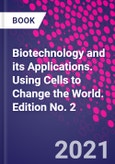Biotechnology and its Applications: Using Cells to Change the World, Second Edition introduces students to the world of biotechnology in a way that runs deeper than a mere survey. Sections cover basic science, introduce cells, explain how they behave, what they are made of, demonstrate the biotechnological application of scientific principles in the laboratory, and present biotechnologies "in the real world.� Examples include recombinant proteins available to millions of patients, plants that have been engineered to produce food for people around the world, and regenerative medicine that may someday allow patients to receive organs that have been grown from their own cells.
The updated edition has been expanded with the most current information available, with new chapters on gene editing, bioremediation, vaccines and immunotherapy, and processing and manufacturing, thus resulting in a modern, robust, yet highly readable applications-oriented introduction to biotechnology.
Table of Contents
Unit?IThe cell
1. An introduction to biotechnology
2. Voyage into the cell
3. Proteins
4. Genes: the blueprints for proteins
5. Cell growth
Unit?II
Biotechnology in the laboratory
6. Microbial killing
7. Cell culture and the eukaryotic cells used in biotechnology
8. Fluorescence
9. Agarose gels
10. The polymerase chain reaction (PCR)
11. Genetic engineering
Unit?III
Biotechnology in the real world
12. Gene delivery
13. RNAi
14. Genome editing
15. DNA fingerprinting
16. Fermentation, beer, and biofuels
17. Stem cells, tissue engineering, and regenerative medicine
18. Transgenics and genetically modified organisms in agriculture
19. Patents and licenses








